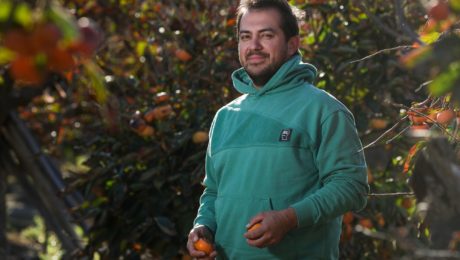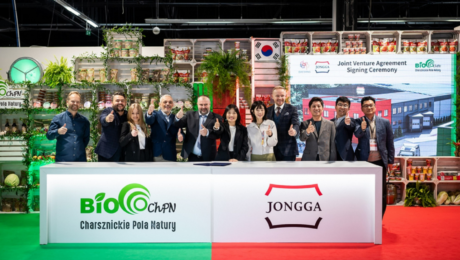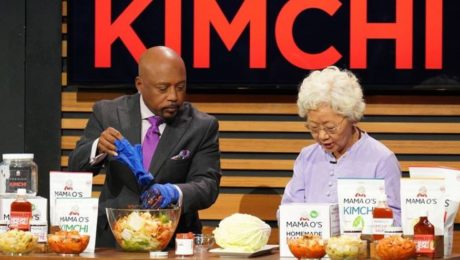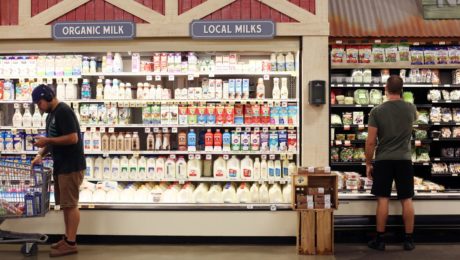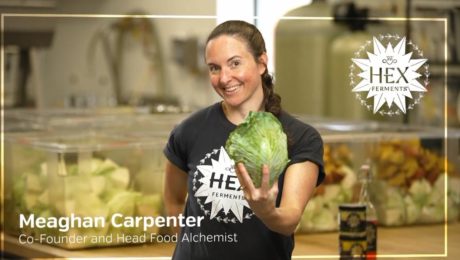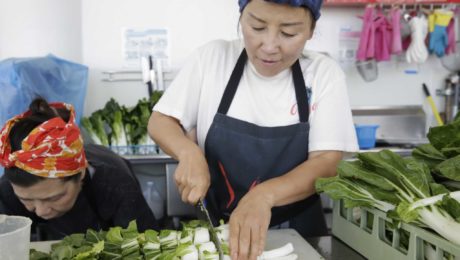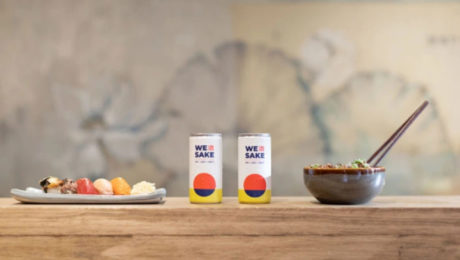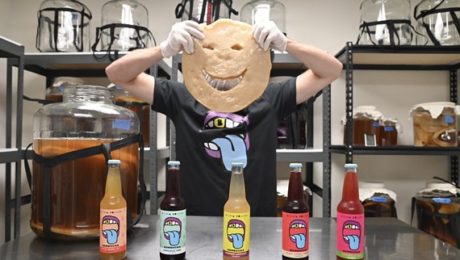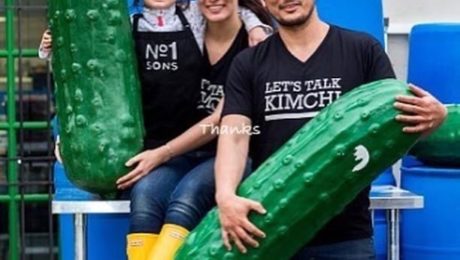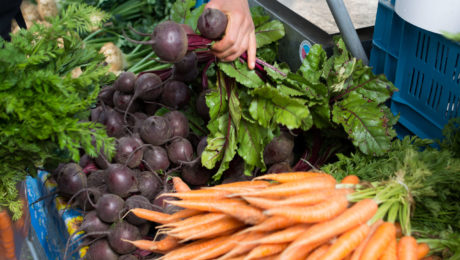Ugly Fruit into Delicious Kombucha
A new Los Angeles-based kombucha brand has a unique approach to their fermented tea. Sunset Cultures owner and chef Balo Orozco (pictured) uses the unsold or “ugly” fruits and vegetables from local farms into “some of L.A.’s most creative kombuchas, hot sauces and condiments.”
Staying true to his goal of curbing food waste and helping local farmers is certainly not easy. Orozco spends much of his days driving across the state to pick up boxes or pallets of produce that would otherwise be thrown away or composted. Another challenge: the kombucha flavors and condiment offerings change with the amount and type of surplus product Orozco receives from farmers. (Sunset Cultures does consistently sell four core kombucha flavors).
Orozco’s roots are in the restaurant industry. As a chef, he was alarmed at the amount of kitchen waste restaurants would throw away. His specialty soon switched to reusing kitchen scraps and fermenting house-produced condiments. After the last restaurant he worked at folded due to the pandemic, he began working on Sunset Cultures.
Sunset Cultures products are always changing and adapting based on available products. In the last six months, Sunset Cultures began making jam, a solution to their own wasted byproduct from the lightly boiled strawberries used in their kombucha.
Sunset Cultures products are currently sold in 40 retail shops and online, with plans to expand to other cities in 2023.
Read more (Los Angeles Times)
- Published in Food & Flavor
Poland Becomes Europe’s Kimchi Hub
The world’s largest kimchi producer – Daesang Corporation – is building their first European factory in Poland.
Daesang is investing $10.6 million to build the Kraków facility. It is a joint venture – called Daesang ChPN Europe – with Polish food producer Charsznickie Pola Natury (ChPN), who specializes in fermented foods. It will be the Korean company’s 11th overseas production facility – one facility is in the U.S. and the others are in China. They plan to produce 3,000 tons of kimchi a year.
“The Polish joint venture is yet another adventure for our attempts to globalize kimchi,” said Lim Jung-bae, CEO of Daesang. “We will do our best to promote the excellence and legitimacy of kimchi in Europe, following our efforts in the US.”
Kimchi is netting huge sales worldwide. Daesang dominates the export market – 60% of kimchi export sales are from Daesang. Their 2021 exports were $67 million, a 131% increase since 2016. European exports are increasing annually for the company at about 20%. The Netherlands and UK are the top European kimchi importers.
Read more (The Korea Herald)
- Published in Business
Shark Tank’s Blunder
Fans are upset after investors on Shark Tank turned down a deal on Mama O’s Premium Kimchi. The exposure, though, netted some big sales for the Brooklyn-based fermentation brand.
Founder Kheedhim Oh and his mom Myung Oh appeared on the show’s 14th season, which aired in October. Oh pitched an investment of $250,000 for 10% equity in the company. But none of the five sharks – four who had surprisingly never tasted kimchi – took the deal. Though kimchi is exploding in popularity in the U.S. (sales increased 90% last year), it illustrates that education is still needed for kimchi to achieve mainstream acceptance in the American market.
“Honestly, I thought they would be more hip to what is actually going on in the world and the wave that fermented foods is having,” Kheedim (a TFA Advisory Board member) said in an interview with TFA. “I was generally just surprised about the lack of general knowledge or interest in fermented foods. The show has made my mission even stronger to help people eat a more Korean diet with kimchi being an important part of it.”
Despite their rejection of the first fermented food to appear on the show, Kheedim said Mama O’s received a nice sales bump from the show. After the show aired, Mama O’s netted four months of business sales in seven days. There was another bump in sales after supermodel Bella Hadid shared on Instagram stories how disappointed she was that the sharks passed on Mama O’s.
“I’m very grateful to Shark Tank because it was a great opportunity to help demystify making kimchi at home using the Mama O’s Homemade Kimchi Kit,” he added.
On the segment, Kheedhim shared his story of beginning the Mama O’s brand with just $50 and a skateboard. Today, Mama O’s sells various kimchi flavors, kimchi paste, kimchi sauce and the make-your-own kimchi kit. Eight years since launching, Kheedim has never used outside investors, always putting his own profits back into the business. Sales were $815,000 in 2021 and will reach an estimated $1 million in 2022. The sharks were impressed with the profits. It costs the company $2.65 a bag to make the kimchi, but it retails for $8.99. The wholesale kits cost $8.25 to make, but sell for $20.
Kheedim – who had to sign an NDA so can’t provide many details about the process – told TFA that he spent months perfecting the pitch, but the live Q&A did not go as smoothly as he wanted. He accidentally handed out his Super Spicy kimchi variety for sampling instead of the classic, milder flavor. He was planning to use the money to hire a production manager, increase broker coverage and fund the brand’s move this month to a larger production space in Queens, New York.
Still, the show has been excellent exposure for Mama O’s. In addition to the sales bump, Mama O’s followers on social media increased and individuals and companies continue to reach out to Kheedim with business opportunities.
During the episode, Kheedim told the sharks how “kimchi is a health food but more importantly it tastes incredible and not just with Korean food either” like hamburgers, hot dogs and mac and cheese.
“What’s makes our kimchi the best is our authentic korean mom recipe,” Kheedim told the sharks.
Kheedim’s mom, Myung, 81, was a fan favorite. She shared how kimchi is an ancient superfood from korea, “naturally fermented and it is full of probiotics.” She also detailed how proud she is of her son, for being an “honest, hardworking entrepreneur who is passionate about kimchi.”
Ultimately, the sharks shared different reasons for not investing. Mark Cuban said he’s concerned Kheedim has been investing his own money back into the company. Lori Greiner says she loves kimchi but found Mama O’s “not investable.” Kevin O’Leary said, though he sees kimchi thriving in the health food space, “the hardest part of this is going to get people to actually try it.” Daymond John admitted he wasn’t “obsessed” with kimchi. Kendra Scott said she didn’t know what kimchi was.
Fans were not pleased. They took to social media to voice their opinion.
“Many entrepreneurs come and go, but only some define the season. What a positive spirit to the pitch. Wishing you all the success.” @umang.thareja
“You should have got the money. They are fools!” @lifebettergreen
“Sharks made a HUGE mistake by not investing. More people in America just need education on kimchi. You guys are going to kill it. Mama O was amazing.” @s.andersn
The day after airing, Kheedim made an Instagram post with the Anthony Bourdain quote: “Americans want kimchi. They want it on their hamburgers. It’s like when Americans started eating sushi. A huge tectonic shift. That funk. That corruption of the flesh. That’s exactly the flavor zone that we are all heading towards.”
Of note: in 2018 during the show’s second season, the sharks did invest in the Kombucha Shop, a DIY kombucha-making kit.
- Published in Business, Food & Flavor
Educating Consumers About Fermentation
Fermentation continues to top food trend lists, health movements and restaurant menus, influencing more curious consumers to buy fermented foods. But the average consumer remains fermentation clueless.
“Fermentation is a really complicated subject and we’re just reaching the tip of the iceberg at this point when it comes to the research,” says Jenna Mills, account manager at Eat Well Global, a food and nutrition consulting agency. “A complicated subject like this is loaded and I feel that individuals and consumer know just enough to be confused.”
Five food professionals shared their thoughts on how to educate consumers about fermentation during a panel at FERMENTATION 2022. Panelists included: Mills, Shannon Coleman (associate professor and state extension specialist at Iowa State University), Matt Lancor (CEO and founder of Kombuchade), and Kirsten Shockey (author, educator and co-founder of The Fermentation School and TFA Advisory Board member). Amelia Nielson-Stowell, editor at The Fermentation Association, moderated.
Simple Messaging
The panelists agreed fermentation brands need to stop overcomplicating fermentation to the consumer, focusing on simple communication strategies.
“I compare it to a small child asking where babies come from – a simple answer is enough,” says Shockey. “With fermentation, often, we’re ready to say that lactic acid bacteria come in and they’re eating carbohydrates and there are these metabolites and flavors involved. We’re ready to share all the details – and we’re met with a blank stare. People just often want to know what’s the difference between a pickle and a ferment.”
Shockey, who teaches at the women-run Fermentation School, says she’s felt pressure over the years to innovate her classes and teach new subjects. But, especially since the Covid-19 pandemic when more consumers focused on health and turned to fermentation, her most popular classes are still the basic fermentation 101.
In a TFA survey last year, 70% of fermentation producers said a greater understanding of fermentation and familiarity with the flavors associated with fermentation would foster increased consumption of fermented foods.
Kombuchade is taking a unique approach to that education component, focusing on kombucha as a recovery drink.
“I’m looking to make probiotics cool for athletes, much like Gatorade made electrolytes cool for athletes,” Lancor says. The science of food is typically a mechanical process: eat fats, carbohydrates and proteins for optimal energy and performance. “There’s actually a microbial fermentation process that’s helping to rebuild your muscles.”
Kombucha marketing is geared toward a yoga, enlightenment crowd, Lancor adds, only reaching a certain number of consumers. It doesn’t resonate with all consumers.
“The south side of Chicago guys that play on my rugby team, they were never going to grab that kombucha bottle off the shelf with that kind of messaging,” he says. “There wasn’t this message of probiotics can be used for performance or recovery or even understanding kombucha’s place within an athlete’s regimen.”
Communicating Science & Tradition
Fermented food brands are tasked with bridging the gap between science and consumer.
Consumers keep informed about food and nutrition trends through professional associations (69%), academic (67%) and dietitians and nutritionists (62%), according to a consumer insights survey by Eat Well Global.
For 77% of consumers, the advice of dietitians and nutritionists impacts which foods they buy. Mills says healthcare professionals offer that counseling on how to incorporate fermented foods into the diet.
Don’t forget the ancestral wisdom, Shockey points out.
“My one liner is we’ve evolved with these foods and you are here because your ancestors successfully fermented,” she says. Rather than educating that people should eat a tablespoon of sauerkraut a day to meet nutrition needs, “try to bring it into your world naturally.” Eat a mixture of ferments, with yogurt at breakfast or hot sauce at lunch and kimchi at dinner.
“We cannot put ferments into this box that must be eaten raw. That to me is a barrier. You should eat this in any way that feels right to you,” she says, adding ferments were traditionally eaten cooked in soups and stews. “But in our minds right now is the idea that we have to eat our probiotics raw. These foods have so many metabolites that are being created in production and they follow through in the cooking process.”
Challenges to Starting a Brand
Starting a fermentation brand can be an overwhelming task. Sandor Katz, fermentation author and educator, said in his keynote address at the FERMENTATION 2022 conference that education is a huge challenge for people launching new fermented products.
“They often end up putting a lot of their energy into educating consumers,” he says.
Coleman says state extension offices are an underutilized resource for new producers. Her office got into food preservation after noticing many Pinterest recipes that gave poor advice on food safety.
“Just about every extension program has some form of food preservation type of program that they are delivering to consumers and they want to help,” Coleman adds.
There are no universal standards for labeling, an obstacle for new producers.
“Labeling is such a sensitive issue because you can get into big trouble with the FDA,” Nielson-Stowell says, pointing out the U.S. Food & Drug Administration only has 12 approved health claims a brand can put on a label. “It also gets tricky putting ‘probiotic,’ ‘prebiotic’ or ‘postbiotic’ on a label. It’s not regulated and confusing to consumers.”
The International Scientific Association of Probiotics & Prebiotics (ISAPP) is pushing for -biotics to be a more protected term. According to ISAPP, only fermented food brands with a scientifically measured -biotic should but it in a label. Their health benefits must be documented. For example, yogurts often have defined probiotic strains on their labels.
Nielsen-Stowell recommends using “live cultures,” “live microbes” or “naturally fermented” instead. And make sure retailers know what that means.
“If you’re getting your set in store with a retailer, the retailer will be your biggest advocate. The retailer is going to be the one talking to the customers more than you. Educate them. Do they know why your product is better than your competitor’s product?” she adds.
PBS Features HEX Ferments
Baltimore-based HEX Ferments was the star of the PBS show START UP. The series highlights small American business owners, chronicling what it takes to start a successful business.
During the episode, HEX Ferments co-founder Maegan Carpenter schooled START UP host Gary Bredow on ferments and gut health. She explained how the modern gut microbiome has been eroded by antibiotics, but fermented foods help to populate and repopulate the digestive system with good bacteria.
“What you’re getting essentially is a vegetable that’s been fermented in a blanket of bacteria that’s indigenious to our bodies: lactobacillus,” Carpenter explained, while Bredow sampled HEX’s seasonal Spirit Berry kombucha and Pizza Kraut sauerkraut.
A former art professor, Carpenter and her co-founder husband Shane, a former wedding photographer, never planned to start a fermentation business. Carpenter began teaching people how to use produce from their local community garden, offering tastings of the vegetables she fermented. Orders for her ferments started showing up in her mailbox. Carpenter said she thinks the demand came from “being open with people and showing people something that has been taken out of our culture for so long.”
Bredow added about modern food convenience: “It’s scary to think about if that convenience goes away, are we going to have a society of people incapable of watching food rot right in front of them.” Carpenter responded: “I think we already do.”
HEX Ferments will be expanding into a new, larger retail space later this year, HEX Superette. The space includes a kombucha taproom, small restaurant area to serve small plates, space to teach education classes and a local food marketplace. HEX Superette, Carpenter said, will “answer the question, ‘How do I eat this?’ because after 10 years of making fermented foods, we often get that question.”
Bredow concluding the episode noting that fermentation was born out of food scarcity, something today’s generation did not understand until the Covid-19 pandemic.
“Our ancestors planned for the future knowing that self sufficiency can mean the difference between life and death. Maybe it’s time to revisit the skills that allowed past generations to live with less fear and reliance on a system that always seems to be on the brink of collapse,” Bredow said. “I love what Meghan and Shane are doing. They’re not only offering up tasty and healthy foods, they’re reminding us how important it is to learn this lost craft before it’s too late…they’re offering fermentation classes. To me, this really is purpose. A focus on doing well and doing good for the world around them.”
- Published in Business, Food & Flavor
SF’s Vegan Kimchi Queen
Aruna Lee’s path to running a fermented food brand is riveting, from her journey as an orphan to Buddhist nun to founder of Volcano Kimchi.
Lee’s story is detailed in a San Francisco Chronicle feature. Adopted by her teacher, she remembers sneaking out of bed in the middle of the night and digging up dongchimi, a winter radish kimchi fermented in large crocks buried in the ground. Later, as a nun in seminary school, Kimchi was communally made during gimjang, the process of kimchi making. The members of the monastery would prepare bulk batches in winter and spring in a large bathtub, storing it in underground crocks.
Curious about the world, Lee later left the monastery and traveled the world. She met her husband and eventually made roots in San Francisco. After the recession forced her to leave her career in the nonprofit sector, she began making kimchi for sale at farmers markets in 2014 without any professional cooking experience. Her organic kimchi is made similarly to how she learned in the monastery — including keeping it vegan.
“When you add fish sauce and shrimp paste, it overpowers everything and you don’t taste each ingredient. When you add simple ingredients, it’s balanced. It has a harmony of that flavor,” Lee says.
Read more (San Francisco Chronicle)
- Published in Business, Food & Flavor
Is the Future of Sake Canned?
Despite dedicated U.S. sake programs and educated American sommeliers, sake has been a harder sell in U.S. Federal regulations have never been able to properly define the drink. It’s taxed as a beer, but regulated as a wine. Education is a big issue. Many Americans think sake is a wine, causing them to drink too much of it and feel sick. Sake is brewed from fermented rice, making it similar to a beer.
“There’s a learning curve, but there’s also a bit of a cultural barrier. Sake can come across the way wine can — this very sophisticated product that’s expensive and that’s a bit esoteric, like you can’t really appreciate it unless you know all the nomenclature,” says Weston Konishi, president of the Sake Brewers Association of North America. “And then there’s the fact that Japanese sake tends to be labeled in Japanese, which most Americans can’t read. That’s been something of a barrier.”
Now more sake brewers are putting their sake in cans, making easy-to-purchase, grab-and-go options. It’s cheaper, too, at $5 a can versus $30 for a bottle.
“There’s something less intimidating about a can versus a bottle — that’s one advantage to canning sake. It’s not so erudite and out of reach,” says Konishi.
Inside Hook highlights six brands selling sake in cans.
Read more (Inside Hook)
- Published in Business
Brewing Kombucha for the Haters
In a crowded kombucha marked, Bitchin’ Boucha founder Jason Smith has a unique philosophy to selling the fermented tea. He’s not going after kombucha die-hards, he’s making it for people who don’t like kombucha.
The Richmond, Virginia brand launched eight years ago when Smith tasted kombucha while on a fast from alcohol and processed sugar. He liked it, but thought he could make it taste better.
“Other kombuchas can be too vinegary because most of the ones in stores are bottled and unpalatable,” explains Smith. “Shipping and refrigerating it for too long can kill the flavor because the kombucha is a living thing. Some companies even pasteurize it so it can’t ferment even more, and it kills all the live organisms which defeats the purpose. I make kombucha for people who don’t like kombucha. I want to show people that it can taste good.”
Bitchin’ Boucha debuts a new seasonal flavor every few months. And every batch of Bitchin’ Boucha must pass the taste test with his own kids. Smith says the process to create a new flavor, secure health department approval and bottle it takes two months. Currently, Bitchin’ Boucha produces 15-20 kegs of kombucha a week. Their first official employee besides Smith will start this month, with Smith aiming to sell the kombucha in a grocery store.
Read more (Style Weekly)
- Published in Food & Flavor
10 Year Old Ferment Brand Shuts Down
After 10 years in business, DC-based ferment shop Number 1 Sons has closed, victim to one of the hardships for many small food producers: operation woes.
Number 1 Sons exclusively sold at farmers markets. Their seasonal ferments ranged from pickles, sauerkraut, kimchi, kombucha and vinegar.
They were one of the early adopters of home delivery when the pandemic hit, investing in six refrigeration vans and making over 30,000 home deliveries in 2020 and 2021. In 2022, they returned to selling at farmers markets. But owners and siblings Yi Wah and Caitlin Roberts said in a statement that they can no longer operate in their current space.
“Since 2012, we’ve made pickled and fermented food and drink that we’ve brought to our neighbors at farmers’ markets across the Washington DC area,” they said. “In the spring of 2020, we transformed overnight from a farmers market pickle company into a pandemic grocery delivery business. Such a business transformation is only possible with incredible community or massive resources. Guess which one we had? Our customers trusted us.”
In a statement, Wah and Roberts said: “many businesses are facing rising costs and an increasingly challenging business environment – we recognize our fellow food businesses that are continuing to evolve, innovate, and grind it out. Local independent businesses are key fibers in the community tapestry.”
“We are thankful, and in awe, of our customers, crew, fellow market businesses, and partners (microbes too!) who have been a part of this salty little thing. It’s been a gift to do this with you.”
Read more (Washingtonian)
- Published in Business
Does Organic vs. Conventional Matter for Fermented Foods?
Organic food is considered by some to be healthier and more nutritious than its conventional counterpart. But what about when that food is fermented? Does organic vs. conventional matter?
A new study reveals some surprising results: when it comes to fermented foods, “the quality of organic food is not always better than conventional food.”
Organic vs. conventional agricultural production is a hotly debated topic – some reports indicate organic food is more nutritious, but other research suggests the nutritional differences are not significant. Meanwhile, fermented foods are scientifically-proven to include higher nutritional value. “During fermentation, the concentration of many bioactive compounds increases, and the bioavailability of iron, vitamin C, beta carotene, or betaine is also improved,” the study notes. Fermented products also “inhibit the development of pathogens in the digestive tract.”
Researchers at the Bydgoszcz University of Science and Technology in Poland questioned whether fermenting organic food would change its nutritional output versus using conventional food. Their results were published in the journal Molecules.
Analyzing fermented plants (pickles, sauerkraut, beet and carrot juices) and dairy (yogurt, kefir and buttermilk), researchers measured the vitamins, minerals and lactic acid bacteria in the items. They compared using organic ingredients in one group to products made from conventional ingredients.
“Research results do not clearly indicate which production system–conventional or organic–provides higher levels of bioactive substances in fermented food,” the study reads.
Results were mixed. Lactic acid bacteria – the good, healthy kind – were higher in organic sauerkraut, carrot juice, yogurt and kefir. Organic kraut and pickles produced more vitamin C than conventional versions. And calcium levels were higher in yogurt made with organic milk.
But, interestingly, lactic acid bacteria levels were higher in conventional pickles and beet juice. Conventional beet juice also had five times more beta-carotene (vitamin A).
Read more (Molecules)

